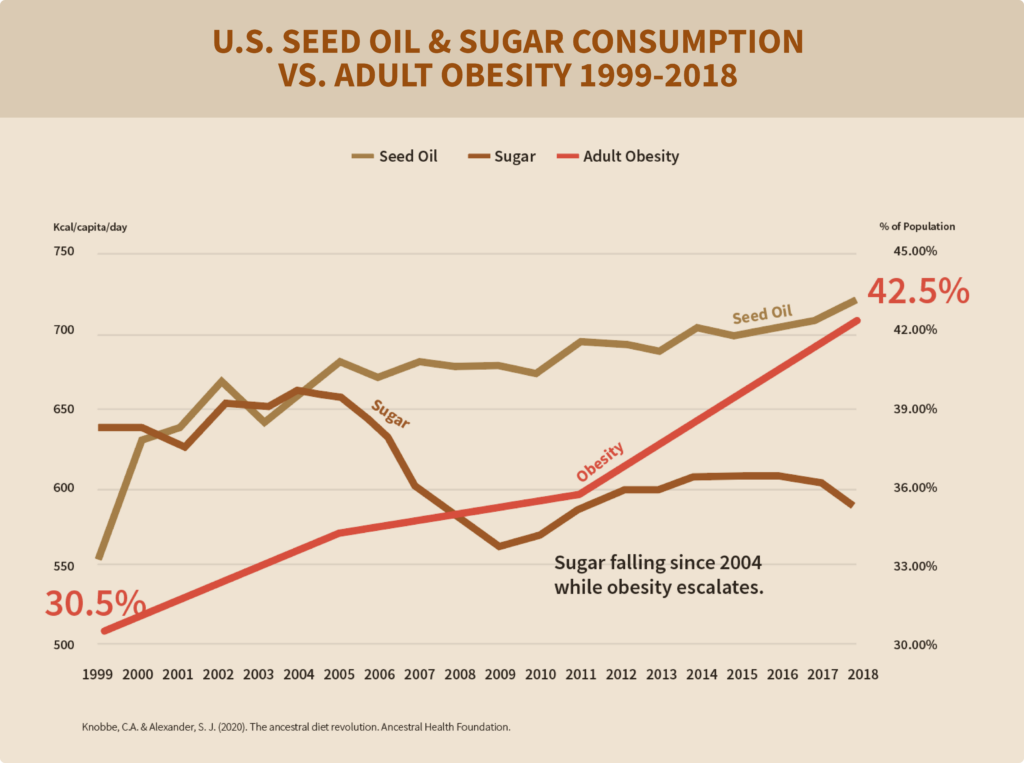In recent years, “seed oils” have become a hot topic of debate, with books, articles, and influencers linking them to various chronic diseases. From salad dressings to snack foods, seed oils have made their way into nearly every modern diet. If you’re aiming to improve your health, it’s essential to understand what seed oils are and how they’re processed and to explore the question: what’s the connection between seed oils and inflammation?
The Problem with Seed Oils
Seed oils, derived from crops like soybeans, cottonseed, and corn, undergo industrial bleaching, hydrogenation, and deodorization to become usable cooking fats (1). These steps strip down these oils, leaving behind a refined, highly processed fat that was never meant to be a staple in the human diet (2).
- Oxidation: The extensive processing of seed oils makes them more vulnerable to oxidation, contributing to inflammatory responses in the body (3).
- Partial Hydrogenation: This process, sometimes used to extend shelf life, creates trans fats, which are well-known for contributing to the development of various diseases (4).
- Concentration: The production of seed oils requires vast amounts of crops—hundreds of ears of corn are needed to produce even a small bottle of oil (5). This results in a high concentration of omega-6 fats—which is challenging to achieve naturally. This imbalance marks a drastic shift from traditional fat consumption, which is what our cells have evolved to consume over millions of years.
Seed Oils and Inflammation: What’s the Connection?
Seed oils are high in omega-6 polyunsaturated fatty acids, primarily linoleic acid. This composition distinguishes them from traditional fats like butter, lard, and tallow, which are higher in saturated and monounsaturated fats (6).
While omega-6 fats are essential in small amounts, the modern diet—heavily reliant on seed oils—creates an extreme imbalance between omega-6 and omega-3 fatty acids. Historically, human diets maintained a 1:1 ratio, but today’s Western diets skew this ratio as high as 20:1 (7).
Mechanisms Driving Seed Oil Inflammation:
- Metabolic Disruption: The metabolic dysfunction caused by excess linoleic acid is a key driver of seed oils inflammation, contributing to insulin resistance and chronic disease (8).
- Reduced Anti-Inflammatory Signals: Omega-3s are crucial for resolving inflammation, but an overabundance of omega-6 fats can suppress their production, limiting the body’s ability to control inflammation (9).
The Rise in Chronic Diseases

Seed oil consumption has skyrocketed from 1 gram per day in 1900 to over 80 grams per day in 2010 (10). This increase parallels the rise in many modern health issues. Despite improvements in public health behaviors—such as more exercise (11), less smoking (12), and reduced alcohol consumption (13)—severe health conditions continue to climb (14, 15).
Seed oils represent one of human history’s most significant dietary changes, aligning closely with the growing prevalence of modern chronic diseases. Mounting seed oil research points to specific ways by which inflammatory seed oils contribute to obesity, diabetes, cardiovascular issues, and other widespread health problems.
Obesity
The rise in obesity rates mirrors the increase in seed oil intake. In 1900, when seed oil intake was minimal, only 1.2% of the U.S. population was obese. By 2018, that number had skyrocketed to 42.5%—a nearly 40-fold increase (16).

From “The Ancestral Diet Revolution” by Chris Knobbe, MD
Seed oil studies link excessive omega-6 intake to increased visceral fat deposition (17). Unlike subcutaneous fat, which is relatively harmless, visceral fat releases inflammatory cytokines that fuel systemic inflammation and elevate the risk of disease (18).
Diabetes
Fasting insulin levels are another critical metric for assessing metabolic health. Elevated fasting insulin is an early indicator of insulin resistance—a condition often preceding type 2 diabetes and cardiovascular disease (19). Seed oil studies show that the pro-inflammatory properties of seed oils can worsen insulin resistance, contributing to the growing epidemic of metabolic syndrome (20).
Cardiovascular Disease
Excessive omega-6 intake generates reactive oxygen species (ROS), which oxidize LDL cholesterol. Oxidized LDL is more likely to accumulate in arterial walls, forming plaques that narrow arteries and increase the risk of cardiovascular disease (21). Research shows that reducing oxidized LDL—not just total LDL—is crucial for improving heart health (22).
The Best Choice: Saturated Fats
Unlike inflammatory seed oils commonly found in the modern diet, saturated fats like butter, ghee, and tallow (found in our Firestarter supplement) are stable, nutrient-rich, and far less likely to contribute to chronic inflammation. These are the dietary fats humans have consumed for tens of thousands of years:
Saturated fats have faced undue criticism since seed oils gained popularity in the 20th century, driven largely by misinformation and financial interests. Research reveals that natural saturated fats are not only safe but also provide significant health benefits.
Benefits of Saturated Fats:
- Improve Lipid Profile: They are less likely to become oxidized and, thus, less likely to contribute to arterial plaque buildup (23).
- Lower Inflammation: Unlike seed oils, saturated fats are low in omega-6, helping to reduce inflammatory processes connected to an unbalanced omega-3 to omega-6 ratio (24).
- Enhance Vitamin Absorption: They boost the absorption of key vitamins (A, D, E, K), supporting immune, bone, and eye health (25).
- Aid Hormone Production: The cholesterol found in these healthy fats is required for the body to create indispensable hormones like testosterone and estrogen (26).
- Promote Cell Health: Their stability helps maintain strong cell membranes, affecting everything from energy production to cell repair (27).
- Support Satiety: They’re more satiating than seed oils, helping control hunger, stabilize blood sugar, and aid in weight reduction (28, 29, 30).
How to Reduce Seed Oils and Inflammation
Making small, intentional changes to your diet can significantly reduce inflammatory seed oil intake and boost overall health. Here are some simple, practical steps:
- Eat Whole Foods: Prioritize unprocessed foods like fresh meat and fruit. These natural options typically don’t contain seed oils and help you avoid hidden sources entirely.
- Read Ingredient Labels: Check labels on packaged foods and avoid products with inflammatory seed oils like soybean, sunflower, and safflower oil.
- Cook with Saturated Fats: Swap out the bottle of canola oil next to your stove for healthier options like butter and ghee, which are more stable at high temperatures. You can even learn how to make your own tallow!
Our ancestors thrived on nose-to-tail eating, which provided essential vitamins, minerals, and healthy fats from traditional sources, and you can too!
The Bottom Line
While modern science may never pinpoint a single cause for the rise in chronic illness, the introduction of seed oils stands out as the most significant dietary shift—and one that we can control. Embracing ancestral dietary principles, such as focusing on nutrient-dense, whole foods, helps reduce seed oil inflammation and restores metabolic health. By adopting these time-tested practices, we can mitigate the risks linked to seed oils and take meaningful steps toward radical health.
Subscribe to future articles like this:

